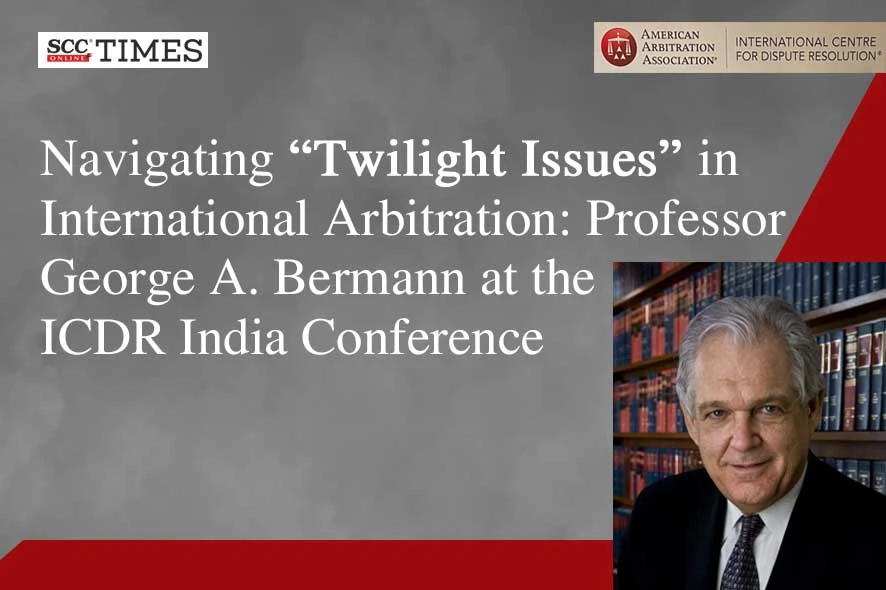Professor George A. Bermann from Columbia University School of Law discussed a project supported by the ICDR, and several key themes related to international arbitration in his keynote address. He emphasized the importance of bridging the gap between academic theory and practical application in arbitration.
A major focus of his talk was on “twilight issues”—recurring challenges that often arise during arbitration but lack adequate guidance. He noted that, despite extensive experience, many panels struggle with these critical issues, which can lead to inconsistent outcomes.
Professor Bermann also shared insights from his recent publication, highlighting the necessity for clearer understanding and guidance on these matters. His aim is to enhance the effectiveness of arbitration by addressing these gaps, making his work relevant for both practitioners and academics alike.
Professor George A. Bermann addressed several significant “twilight issues” that arise throughout the lifecycle of international arbitration, emphasizing their often-ambiguous nature. He defined these issues as neither strictly substantive nor procedural, illustrating how arbitrators sometimes feel in the dark about how to navigate them.
To begin, he identified common challenges that surface early in the arbitration process, such as the non-signatory problem. While this issue is familiar to practitioners, Professor Bermann highlighted the lack of clear guidance for tribunals. In domestic courts, established forum law offers answers, but international tribunals operate without such clear frameworks. Questions arise about when a non-signatory can bring or face a claim and when a party has waived its right to arbitration. These are complexities that regularly challenge arbitrators.
He remarked that as the arbitration progresses, other recurring issues emerge, including the authority of the tribunal to issue anti-suit injunctions. Professor Bermann also posed questions about the extent to which a tribunal can restrain judicial proceedings in another jurisdiction and the criteria for exercising that authority.
Professor Bermann highlighted the concept of ‘res judicata’ as another critical twilight issue in international arbitration. He said that unlike courts, which have a well-established doctrine of res judicata to prevent re-litigation of resolved issues, arbitrators often lack clear guidelines on how to handle this principle.
Professor Bermann noted that his most recent expert opinion focused on how tribunals should address arguments related to res judicata, reflecting its significance in arbitration practice.
Professor Bermann emphasized that these issues are not obscure; they occur regularly in arbitration. However, the lack of sufficient guidance on these matters remains a significant challenge, which the project aims to address. By bringing these twilight issues into the light, he hopes to enhance the understanding and effectiveness of international arbitration practices.
He also touched on issues of privilege and testimonial privilege and questioned whether tribunals have the authority to conduct independent research. These topics illustrate the nuanced challenges arbitrators face, underscoring the need for clearer guidance on these twilight issues to enhance the effectiveness of international arbitration.
In addressing the twilight issues in international arbitration, Professor George A. Bermann outlined how tribunals currently navigate these complexities and what they could do to improve their approach.
He said Tribunals often look to national law as a fallback when faced with twilight issues. There are four main sources they might consult:
-
Law of the Seat
-
Lex Causae
-
Law of the Place of Probable Enforcement
Professor Bermann underscored that one of the key objectives of the project supported by the ICDR was to explore how to effectively match twilight issues with relevant national bodies of law. This involves identifying which specific legal frameworks could provide guidance on recurring challenges that arbitrators face, thus enhancing the consistency and clarity of decision-making in international arbitration.
He also briefly discussed the merits of having an international standard.
Professor Bermann outlined several promising avenues for developing international standards in addressing twilight issues in arbitration. Here are the key points from his discussion:
Soft Law
Professor Bermann emphasized that international arbitration is rich in soft law, which is critical for filling gaps related to twilight issues. Instruments produced by organizations such as the IBA and ILA can provide valuable guidance for tribunals. Despite some criticisms of soft law, he believes its abundance can be beneficial, as it reflects collective deliberation and offers practical solutions.
Arbitral Jurisprudence
He pointed out that international standards can also be derived and inferred from arbitral jurisprudence. Further, he mentioned that ICDR ICDR itself has launched a project for mining arbitral awards for the purpose of unearthing the answers to twilight issues. While the comprehensive dataset of awards is not fully accessible, there is still enough material to draw meaningful insights.
International Law
Professor Bermann noted the potential of international law as a source of standards, especially concerning issues like corruption in arbitration. Treaties can guide arbitrators on applicable norms, and Article 38 of the ICJ Statute suggests we can draw on what the statute calls general principles of law to fill the gaps that plague twilight issues.
Community Engagement
He underscored the importance of regular discussions within the arbitration community, such as conferences and forums, where practitioners can collectively work toward establishing international standards. This community engagement fosters the development and recognition of emerging standards.
Conclusion:
In concluding his address, Professor George A. Bermann raised important concerns regarding the use of international standards in arbitration.
He reminded the audience that while the pursuit of international standards is appealing, it is crucial to respect national laws. Issues such as non-signatories and arbitrability must be handled in accordance with the relevant national legal frameworks. He also highlighted the need to consider the legitimate expectations of the parties involved in arbitration.
Professor Bermann acknowledged that his vision for developing international standards may seem visionary, but he sees it as a necessary step forward. He urged practitioners to move away from improvisation and toward more rational, principled decision-making. His hope is that by addressing these important questions thoughtfully, the arbitration community can enhance its effectiveness and credibility.






